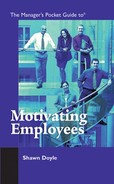Motivating with Rewards and Recognition
Reward is defined in the dictionary as something given or received in recompense for worthy behavior or in retribution for evil acts. I think it is useful for managers to understand that reward is given for worthy behavior. When managers reward behavior, the employee wants to repeat that behavior.
It is very important for managers to understand that reward is a key tool in establishing a motivating environment. As Mark Twain once said, “I can live for two months on a good compliment.” Compliments have an amazing impact on employees. If we consider rewards, almost all rewards are an expression of a compliment. Rewards say to an employee “You did a good job” or “I appreciate your contributions.” Almost all human beings respond positively to rewards and recognition. I once worked really hard on a meeting at work and it was very successful. One evening when I got home, my wife said a box had arrived from my manager. He had sent a box of steaks with a nice note, and this reward made me feel like my efforts had been appreciated.
As managers, we need to think strategically and plan for short-, mid-, and long-term rewards. Rewards need to be budgeted for and planned out for the year to ensure that they happen. If managers don’t plan for rewards, they get busy and the year slips by quickly. There are several different categories of rewards a manager should think through and plan:
• MBO reward. The manager and employee agree on a specific objective for the year, and if the objective is met, the employee gets a reward for the accomplishment.
• Accomplishment reward. The manager identifies an outstanding achievement and decides to reward that achievement.
• Tenure award. Awarding someone for being in the company, department, or team for a certain time frame.
• Employee of the month. This is a common award and is given to the best-performing employee of that month.
• Contests A contest can be held for a particular skill set or topic. It can be any topic that the manager designates. The key is to lay out all the rules in advance in writing and to have a great prize for the winner.
• Promotions. Employees are promoted and receive an increase in their pay and benefits.
The manager must decide what is going to be rewarded, how it is going to be rewarded, and when it is going to be given.
When rewards are given, they should be given in a way to maximize the impact of the reward. This can be done publicly at a team meeting or privately in the office. Sometimes, a breakfast or lunch can be a good forum for giving out a reward.
Some managers think they can’t afford reward because it is too expensive. First, there needs to be a commitment from upper management to pay for reward and recognition. Second, in today’s environment, organizations can’t afford not to provide rewards and recognition, because if they don’t, employees will leave. The cost of locating and training a new employee is very expensive.
There is an old school of management that says, “Why should I reward my employees for work that they should be doing anyway?” There is some logic to that statement, or I should say, was logic to that statement many years ago. Today there is a tremendous influx of new workers into the work place with a different generational mind-set. The “carrot and stick” versus “the club” argument is over! The “club” is the philosophy that workers work better and are more productive when they are in fear. “The carrot and stick” philosophy says that if you give people a motivating environment and reward them, they will be more productive. Most managers who are successful understand the value of a motivating environment.
